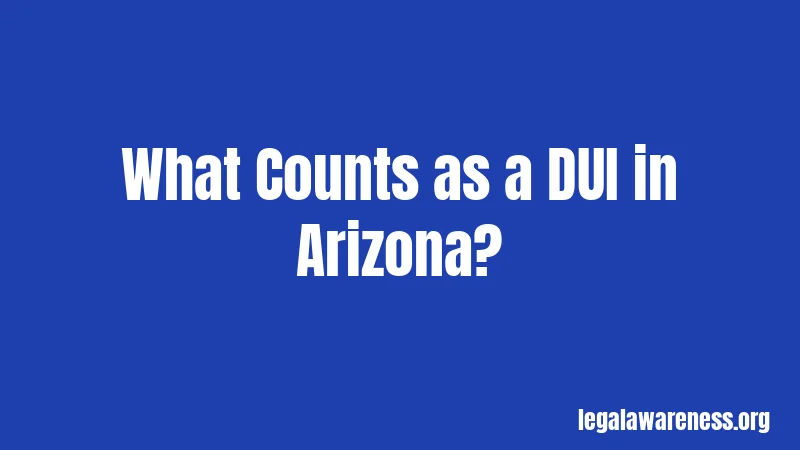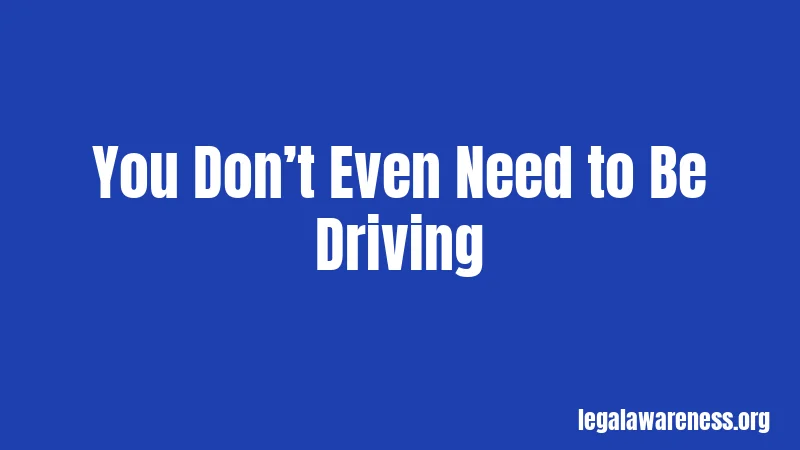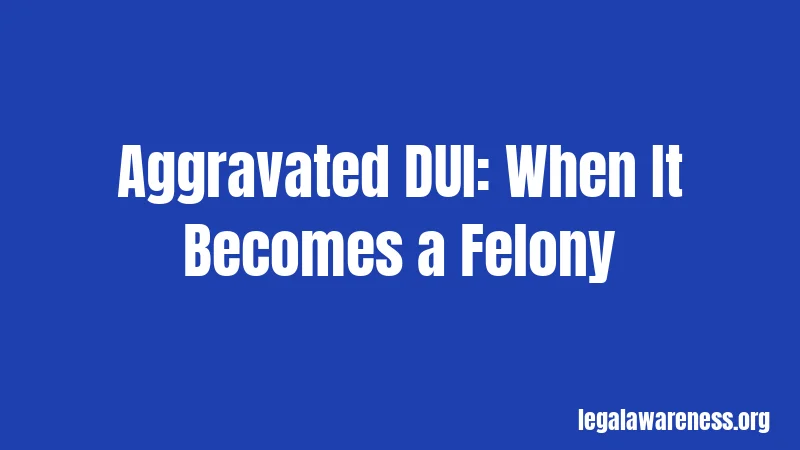DUI Laws in Arizona (2026): How One Mistake Costs $10,000+
Most people don’t realize how serious Arizona’s DUI laws really are. Seriously. You could be driving perfectly fine, get pulled over at a checkpoint, blow a 0.08, and boom. Ten days in jail. Minimum. No exceptions.
Arizona doesn’t mess around with drunk driving. The state has some of the toughest DUI laws in the entire country. Let’s break down exactly what you’re facing if you get pulled over.
What Counts as a DUI in Arizona?

Here’s the deal. In Arizona, you can get a DUI in two different ways.
First way is the obvious one. If your blood alcohol concentration hits 0.08% or higher, you’re legally drunk. Period. Doesn’t matter if you feel fine or if you’re driving perfectly. The number alone is enough to arrest you.
But here’s where it gets tricky. Arizona has this thing called “impaired to the slightest degree” law. Basically, even if your BAC is under 0.08%, you can still get charged with DUI if the cop thinks you’re impaired at all.
Sound unfair? Maybe. But that’s Arizona law.
Let’s say you have a couple drinks at dinner. Your BAC is only 0.04%. You’re swerving a bit or you caused a minor accident. The officer can still charge you with DUI because you showed signs of impairment. Yep, that’s all it takes.
Different BAC Limits for Different Drivers
Not everyone has the same legal limit. Honestly, this surprises a lot of people.
Regular drivers like you and me get the standard 0.08% limit. But other people face much stricter rules.
Commercial truck drivers face a limit of just 0.04%. That includes anyone driving 18-wheelers or other big vehicles for work.
Here’s a newer one. As of 2025, Uber and Lyft drivers now have the same 0.04% limit. It used to be 0.08%, but Arizona changed that. Taxi drivers too. So if you drive for a rideshare company, you’re held to the same standard as truckers.
And if you’re under 21? Zero tolerance. Any detectable alcohol in your system is illegal. Even 0.01% can get you charged. Arizona doesn’t play around with underage drinking and driving.
You Don’t Even Need to Be Driving

Wait, it gets better. Or worse, depending on how you look at it.
Arizona can charge you with DUI even if you’re not actually driving. You just need to be in “physical control” of the vehicle.
What does that mean? Well, if you’re sitting in the driver’s seat with the keys in your pocket, that’s physical control. Engine running while you’re sleeping it off in the parking lot? Physical control. Basically, if you’re in a position where you could drive, they can charge you.
Here’s another kicker. Arizona law says they can charge you with DUI if your BAC is 0.08% or higher within two hours of driving. So even if you’re home on your couch, if they can prove you were drunk within two hours of driving, you’re still on the hook.
Not sure what counts as a violation? It’s actually pretty broad.
The Three Types of Regular DUI
Arizona breaks down DUI charges into three categories based on how drunk you are. Each one gets progressively worse.
Standard DUI
This is your basic DUI. BAC between 0.08% and 0.149%. Still a Class 1 misdemeanor, but the penalties hurt.
For a first offense, you’re looking at ten days in jail minimum. However, nine of those days can be suspended if you complete alcohol screening and treatment. So really, you’re serving one full day, but you still have to do the programs.
The fine starts at $1,250. But with all the fees, surcharges, and court costs, you’re really paying closer to $1,600 to $2,000.
Your license gets suspended for 90 days minimum. Could be up to a year. And you’ll need to install an ignition interlock device for at least 12 months after that.
Extreme DUI
BAC between 0.15% and 0.199%. Now we’re talking serious penalties.
Thirty days in jail minimum. No exceptions. No probation. You’re doing the time. Some of it might be suspended, but you’re still serving real jail time.
Fines jump to around $2,500, but with all the extra costs, expect to pay closer to $3,000 total.
License suspension lasts up to a year. The ignition interlock device? You’ll need that for 12 months minimum after reinstatement.
Super Extreme DUI
BAC of 0.20% or higher. This is the worst of the misdemeanors.
Forty-five days minimum jail time. Again, some might be suspended, but you’re serving significant time behind bars.
Fines start at $2,750 but easily hit $3,000 to $3,500 with all the fees.
You’ll need an ignition interlock device for 18 months after getting your license back. And yes, your license will be suspended for up to a year first.
Pretty straightforward, right? Well, it gets more complicated.
Aggravated DUI: When It Becomes a Felony

Okay, pause. Read this carefully.
An aggravated DUI is a felony. Not a misdemeanor anymore. This is where things get really serious.
You can get charged with aggravated DUI in these situations:
You get a third DUI within seven years. Even if the first two were years ago, that third one makes it a felony.
You’re driving with a suspended or revoked license and get caught drunk. That’s an automatic aggravated DUI.
You have a child under 15 in the car. Doesn’t matter if it’s your first DUI ever. Kid in the car makes it a felony.
You’re driving the wrong way on a highway while drunk. Happens more often than you’d think, and Arizona takes it very seriously.
The penalties? Four months minimum in prison. Not jail. Prison. Some cases require even longer sentences.
Fines can hit six figures in extreme cases, though typically they’re in the tens of thousands.
Once you’re out, that felony stays on your record forever. You lose your right to vote and your right to own guns. Employment becomes much harder. It follows you everywhere.
Honestly, this is the part most people miss.
Second and Third DUI Offenses
Made this mistake before? The penalties basically double.
Second DUI within seven years means 90 days minimum jail time. Maybe 60 days can be suspended, but you’re still doing 30 days.
Fines jump to around $3,000, but total costs hit $3,500 easily.
Your license gets suspended for a full year. The ignition interlock device is mandatory for 18 months after reinstatement.
Third DUI? That’s automatically a felony. Four months minimum in prison, and you’re looking at a Class 4 felony charge.
You’re not alone, this confuses a lot of people. But the law is pretty clear about repeat offenses.
What a DUI Really Costs
Hold on, this part is important.
Everyone talks about the fines, but a DUI costs way more than that. We’re talking $7,000 to $11,000 for a first offense. Some cases exceed $20,000 or even $30,000.
Let’s break it down:
Fines and fees: $1,500 to $3,000 depending on your charge. This includes court costs, surcharges, and administrative fees.
Jail fees: Yep, they charge you to be in jail. One-time booking fee of about $62, plus roughly $63 per day. A 30-day sentence could cost you nearly $2,000 in jail fees alone.
Ignition interlock device: Installation runs $100 to $200. Then you pay $70 to $100 per month for monitoring and maintenance. Over a year, that’s $940 to $1,400.
Alcohol screening and education: Mandatory programs cost $500 to $1,000. You have to complete them to get your license back.
License reinstatement: Another $20 to $50 when you finally get your license back.
Towing and impound: If they tow your car, expect $100 to $300 for towing, plus $25 per day storage, plus around $150 for administrative fees. Leave it there a week and you’re paying $500 easily.
Insurance increases: This is the big one. Your premiums will likely double or triple. Average increase is about $2,000 to $3,000 per year for three to five years. That’s $6,000 to $15,000 in extra insurance costs alone.
SR-22 insurance: Arizona requires this high-risk insurance certificate for three years. Not only do you pay more, but you’re stuck with it for years.
Lost wages: Time in jail, court appearances, and mandatory programs mean missing work. Many people lose their jobs entirely if driving is required.
Legal fees: A good DUI attorney costs $2,500 to $10,000 or more. But honestly, it’s worth it to have someone fight for you.
Add it all up? Most first-time DUIs cost between $10,000 and $20,000 total. And that’s not counting the long-term career impacts.
Makes sense, right?
What Happens After You Get Arrested
Trust me, this works differently than most people think.
First, the officer confiscates your license right there. They give you a paper temporary license that’s good for 15 days. That’s it. Fifteen days.
During those 15 days, you can request an Admin Per Se hearing with the Motor Vehicle Division. This is your chance to fight the automatic license suspension. But you only get 15 days to request it. Miss that deadline and your license is suspended automatically.
Your license suspension starts immediately if you don’t request a hearing or if you lose the hearing. For a first offense, that’s 90 days minimum. Could be up to a year.
The criminal case is separate. You’ll get a court date, and that’s where the jail time and fines get decided. The license suspension happens through the MVD, the criminal penalties happen through the court. Two different processes.
Confused about the difference? Let me break it down. The MVD handles your driving privileges. The court handles your criminal punishment. Both happen at the same time, but they’re separate systems.
Drug DUIs Work the Same Way
Not sure what counts as a drug DUI? It’s actually not complicated.
Any amount of illegal drugs in your system is grounds for a DUI charge. Marijuana. Cocaine. Heroin. Whatever it is, if it’s illegal and you’re driving, that’s a DUI.
Prescription drugs count too if they impair you. Doesn’t matter if a doctor gave them to you legally. If they affect your driving and you cause an accident or get pulled over, you can face DUI charges.
The penalties are basically the same as alcohol DUIs. Same jail time. Same fines. Same license suspension.
One small difference. If your DUI was purely drug-related with no alcohol involved, you might not need the ignition interlock device. That changed back in 2017. But if there’s any alcohol involved, you’re getting that device installed.
How to Protect Yourself
So what happens if you break this law? Let’s talk about what you should do.
First, contact a DUI defense attorney immediately. Seriously, don’t wait. Don’t try to handle this yourself. These laws are complicated, and a good lawyer knows how to challenge the evidence.
Show up to every court date and meeting. Miss one and you could end up with a warrant for your arrest.
Request that MVD hearing within 15 days. This is critical. It’s your only shot at keeping your license during the case.
Consider enrolling in alcohol education programs before the court requires it. Shows the judge you’re taking responsibility.
If possible, use an alcohol monitoring system and provide the data to your attorney. Proves you’re staying sober during your case.
Don’t make any statements to the police without a lawyer present. Anything you say can and will be used against you.
Here’s where it gets interesting. A good attorney might be able to get your charges reduced. They can challenge whether the stop was legal. They can question the accuracy of the breathalyzer or blood test. They can argue that you weren’t actually in physical control of the vehicle.
Basically, there are defenses available, but you need a professional to find them.
Special Circumstances
Wait, there’s more to know.
Arizona has something called the “Shelter Rule.” If you pull over to sleep it off instead of driving home drunk, that might be a defense. The idea is that you were trying to be responsible by not driving.
However, if you’re in the driver’s seat with the keys in your possession, you’re still technically in physical control. So the Shelter Rule doesn’t always work. It’s a tough defense to use successfully.
If you refuse the breathalyzer or blood test, your license gets suspended automatically for 12 months minimum. First refusal is 12 months. Second refusal within seven years is 24 months. Arizona has implied consent laws, meaning by driving, you already agreed to be tested.
Refusing the test doesn’t mean you won’t get charged. The officer can still charge you with DUI based on observed impairment. And that automatic suspension happens regardless of whether you’re convicted.
Wondering if this applies to you? If you drive in Arizona, it applies to you. Period.
Recent Changes for 2025-2026
Now, here’s what’s changed recently.
The biggest update is the new BAC limit for rideshare drivers. Starting in 2025, Uber, Lyft, and taxi drivers face the same 0.04% limit as commercial drivers. It used to be 0.08%, but Arizona tightened the rules.
This means if you drive for Uber on weekends, you need to be extra careful. Even one drink could put you over the limit.
Ignition interlock devices are now required for all alcohol-related DUI convictions. Even first-time offenders get them. There’s no exception anymore unless your DUI was purely drug-related with zero alcohol.
Court-approved DUI education classes are available online now. Makes it easier to complete the requirements if you have work or family obligations.
Insurance companies are cracking down harder on DUI convictions. Expect those premium increases to last longer, sometimes five years instead of three.
Pretty much everything else stayed the same. Arizona’s DUI laws have been strict for years, and they’re not getting softer anytime soon.
How to Avoid a DUI
Okay, this one’s important. Probably the most important part.
Plan ahead. Always. If you’re going out drinking, decide before you leave how you’re getting home. Designate a driver. Call an Uber. Stay where you are. Just don’t drive.
Use ride-sharing apps. They’re everywhere in Arizona, and they’re way cheaper than a DUI. Seriously, a $30 Uber ride beats a $10,000 DUI conviction every single time.
If you’ve had even one drink, think twice about driving. Arizona’s “slightest degree” law means you don’t need to be drunk to get charged. Just impaired a little bit.
Keep track of your drinks and give yourself time. One drink per hour is a rough guideline, but everyone processes alcohol differently. If in doubt, don’t drive.
Host friends at your place instead of going out. Or if you’re at someone else’s house, plan to crash there for the night.
Invest in a personal breathalyzer if you drink regularly. They’re not perfectly accurate, but they give you a rough idea. If it shows any alcohol, don’t drive.
Remember, it’s not worth it. Ever. One bad decision can cost you thousands of dollars, your license, your job, and even your freedom.
Frequently Asked Questions
Can I get a DUI on a bicycle in Arizona?
No. Arizona’s DUI laws specifically apply to motor vehicles. Bicycles, scooters, and skateboards don’t count. However, you could face other charges like disorderly conduct or public intoxication.
How long does a DUI stay on my record in Arizona?
Forever. DUI convictions in Arizona are permanent on your criminal record. For sentencing purposes, courts look back seven years for prior offenses. But the conviction itself never goes away.
Can I refuse a field sobriety test?
Yes, but it won’t help you. Refusing any tests triggers an automatic 12-month license suspension. And the officer can still arrest you based on other observations like smell, speech, or behavior.
Will I definitely go to jail for a first DUI?
Yes. Arizona has mandatory minimum jail sentences. First offense is ten days minimum, though nine might be suspended if you complete treatment. But you’re serving at least 24 hours no matter what.
Can I get my DUI reduced to a lesser charge?
Sometimes. A skilled attorney might negotiate a plea deal for reckless driving or another lesser charge. But Arizona prosecutors don’t offer these deals easily. It depends on the specific facts of your case.
Final Thoughts
Now you know the basics. Arizona’s DUI laws are tough. They’re expensive. And they don’t give you much room for mistakes.
The penalties hit hard. Jail time is mandatory. Fines are steep. Your license disappears. Insurance costs skyrocket. And all of this can happen from one night of bad judgment.
But here’s the thing. It’s completely preventable. Every single DUI is a choice. Choose not to drive after drinking. Choose to call a ride. Choose to stay where you are.
If you’re already facing charges, get a lawyer immediately. Don’t try to handle this alone. The system is complicated, and you need someone who knows how to navigate it.
Stay informed, stay safe, and when in doubt, don’t drive. It’s really that simple.
References
- Arizona Revised Statutes Title 28, Chapter 4, Article 3: Driving Under the Influence – https://www.azleg.gov/arsDetail/?title=28
- Arizona Governor’s Office of Highway Safety – DUI Information – https://www.azgohs.gov/
- Arizona Department of Transportation Motor Vehicle Division – License Suspension Information – https://azdot.gov/motor-vehicles
- Arizona Courts – DUI Case Processing – https://www.azcourts.gov/
- Arizona State Legislature – Senate Bill 1025 (Rideshare Driver BAC Limits) – https://www.azleg.gov/
